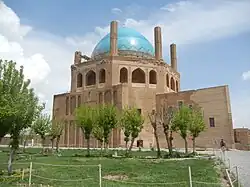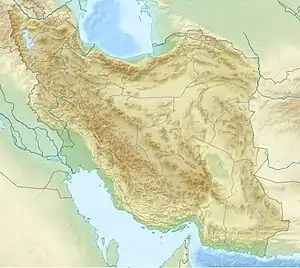Soltaniyeh
Persian: سلطانيه | |
|---|---|
City | |
 | |
 Soltaniyeh | |
| Coordinates: 36°26′05″N 48°47′44″E / 36.43472°N 48.79556°E[1] | |
| Country | |
| Province | Zanjan |
| County | Soltaniyeh |
| District | Central |
| Elevation | 1,784 m (5,853 ft) |
| Population (2016)[2] | |
| • Total | 7,638 |
| Time zone | UTC+3:30 (IRST) |
Soltaniyeh (Persian: سلطانيه, also Romanized as Solţānīyeh, Solţāneyyeh, Sultaniye, and Sultānīyeh; also known as Sa‘īdīyeh;[3]) is a city in the Central District of Soltaniyeh County, Zanjan province, Iran, and serves as capital of both the county and the district.[4]
At the 2006 census, its population was 5,864 in 1,649 households, when it was in Soltaniyeh District of Abhar County.[5] The following census in 2011 counted 7,116 people in 2,013 households.[6] The latest census in 2016 showed a population of 7,638 people in 2,319 households,[2] by which time the district had been separated from the county in the establishment of Soltaniyeh County.[4]
History
Soltaniyeh, located some 240 kilometres (150 mi) to the north-west of Tehran, was built as the capital of Mongol Ilkhanid rulers of Iran in the 14th century. Its name which refers to the Islamic ruler title sultan translates loosely as "the Regal". Soltaniyeh was visited by Ruy González de Clavijo, who reported that the city was a hub of silk exportation.[7]
In 2005, UNESCO listed Soltaniyeh as one of the World Heritage Sites. The road from Zanjan to Soltaniyeh extends until it reaches to the Katale khor cave.
William Dalrymple notes that Öljaitü intended Soltaniyeh to be "the largest and most magnificent city in the world" but that it "died with him" and is now "a deserted, crumbling spread of ruins."[8]
Ecclesiastical history
The city was established as a Catholic episcopal see on 1 April 1318 for the Archdiocese of Soltania. In 1329, the Latin Diocese of Samarcanda became its suffragan for the Chagatai Khanate, at least until Tamerlane (founder of the Timurids) swept its see Samarkand. The archdiocese was suppressed as residential see around 1450.
Residential archbishops
- Metropolitan Archbishops of Soltania
- Francesco da Perugia, Dominican Order O.P. (1318.08.01 – ?)
- Guillaume Adam, O.P. (1322.10.06 – 1324.10.26); previously Archbishop of Smirna (Smyrna) (Asian Turkey, now Izmir) (1318 – 1322.10.06); later Metropolitan Archbishop of Bar (Montenegro) (1324.10.26 – death 1341)
- Giovanni di Cori, O.P. (1329.08.09 – ?)
- Guglielmo, O.P. (? – ?)
- Giovanni di Piacenza, O.P. (1349.01.09 – ?)
- Tommaso, O.P. (1368.02.28 – ?)
- Domenico Manfredi, O.P. (1388.08.18 – ?)
- Giovanni di Gallofonte, O.P. (1398.08.26 – ?)
- Nicolò Roberti (1401.01.24 – ?); previously Bishop of Ferrara (Italy) (1393.02.04 – 1401.01.24)
- Thomas Abaraner, O.P. (1425.12.19 – ?)
- Giovanni, O.P. (1425.12.19 – ?)
Titular see
Transformed at its suppression as residential see in 1450 into a Latin Titular archbishopric, which was itself suppressed in 1926:
- Titular Bishop Francisco Salazar, Friars Minor (O.F.M.) (1548.09.12 – ?)
- Titular Bishop: Bishop-elect Bernardino de Carmona (1551.07.10 – ?)
- Titular Archbishop Alberto Bitter (1922.10.09 – 1926.12.19)
See also
- Dome of Soltaniyeh
- Ab Anbar
- List of Catholic dioceses in Central Asia
- Yakhchal
- Traditional water sources of Persian antiquity
Sources and external links
- Official website
- GCatholic, with residential and titular incumbent bio links
- Video of Soltaniyeh
- Farnoush Tehrāni, The Crown of All Domes, in Persian, Jadid Online, 31 December 2009,.[9]
• Audio slideshow:[10] (6 min 45 sec).
Further reading
- Hatef Naiemie, Atri (2020). "The Ilkhanid City of Sultaniyya: Some Remarks on the Citadel and the Outer City". Iran: Journal of the British Institute of Persian Studies: 1–30. doi:10.1080/05786967.2020.1744469.
- Minorsky, V.; Bosworth, C.E & Blair, Sheila S. (1997). "Sulṭāniyya". In Bosworth, C. E.; van Donzel, E.; Heinrichs, W. P. & Lecomte, G. (eds.). Encyclopaedia of Islam. Volume IX: San–Sze (2nd ed.). Leiden: E. J. Brill. pp. 859–861. ISBN 978-90-04-10422-8.
References
- ↑ OpenStreetMap contributors (25 February 2023). "City, Soltaniyeh County" (Map). OpenStreetMap. Retrieved 25 February 2023.
- 1 2 "Census of the Islamic Republic of Iran, 1395 (2016)". AMAR (in Persian). The Statistical Center of Iran. p. 19. Archived from the original (Excel) on 27 April 2022. Retrieved 19 December 2022.
- ↑ Soltaniyeh can be found at GEOnet Names Server, at this link, by opening the Advanced Search box, entering "-3081931" in the "Unique Feature Id" form, and clicking on "Search Database".
- 1 2 "Zanjan became the owner of two cities and a new county". Islamic Republic News Agency (in Persian). Archived from the original on 14 October 2013. Retrieved 25 February 2023.
- ↑ "Census of the Islamic Republic of Iran, 1385 (2006)". AMAR (in Persian). The Statistical Center of Iran. p. 19. Archived from the original (Excel) on 20 September 2011. Retrieved 25 September 2022.
- ↑ "Census of the Islamic Republic of Iran, 1390 (2011)". Syracuse University (in Persian). The Statistical Center of Iran. p. 19. Archived from the original (Excel) on 21 January 2023. Retrieved 19 December 2022.
- ↑ Clavijo, Ruy Gonzalez de (1859). Narrative of the embassy of Ruy Gonzalez de Clavijo to the court of Timour at Samarcand, A.D. 1403-6. p. 93. Retrieved 10 April 2018.
- ↑ Dalrymple, William (1989). In Xanadu. pp. 128–129.
- ↑ سلطان گنبدها | جدید آنلاین. Jadidonline.com. Retrieved on 2012-02-10.
- ↑ Flash video. jadidonline.com
